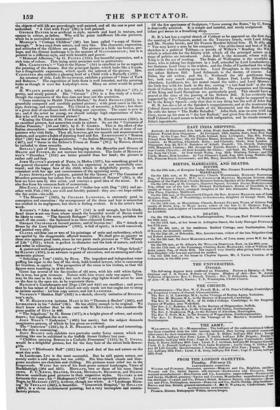H. B. 'a last has a capital sketch of Cobbett
as he appeared on the first day the meeting of Parliament, seated on the Treasury bench, with Lord Alth and Mr. Stanley beside, and Sir Francis Burdett behind him. H. B. slily a " You may know a man by his company." One of the latest and best of H. sketches is a political Tableau-a parody of Wilkie's " Reading the Will which is admirable for the felicity with which all the principal actors on stage of politics are introduced. John Bull is the deceased, whose will King is in the act of reading. The Duke of Wellington is the wrathful dame, who is taking her departure in a huff, attended by Lord Londonderry her footman. Lord Grey is the widow, and the Duke of Cumberland the w ered soldier who is making up to her. Lord Brougham is the nurse (land the infant Reform Bill. Lord Sid mouth is the doctor, of course. Eldon the old widow, and Sir C. Wetherell the old gentleman b her, look very much chagrined. Sir Robert Peel, Lords Ellenborou Aberdeen, Lyndhurst, Sac. are seated round the table ; and Lord Monson the little boy with his back to the fire, casting " a last fond look" at the ti deeds of Ciatton in the box marked Schedule A. The expression and liken of the King and Lord Brougham are particularly good. This should have a peered at the time of the passing of the Reform Bill. It has evidently suggested by the" Tabbyloos" at Hatfield House. It might be supposed to fir to the King's Speech-only that that is any thing but the will of John B
H. B. has also a hit at the Speaker's reappointment, and at the treatment t Colonel Jones received at the hands of the Ministerial and the Radical par He calls the latter " The Buffer Rebuffed." John Bull, arm-in-arm with Grey, turns up his nose at " the low Radical," and gives him the cut direct : bluff Colonel's baard seems to bristle with indignation, and he stands amazed John's ingratitude.






















 Previous page
Previous page